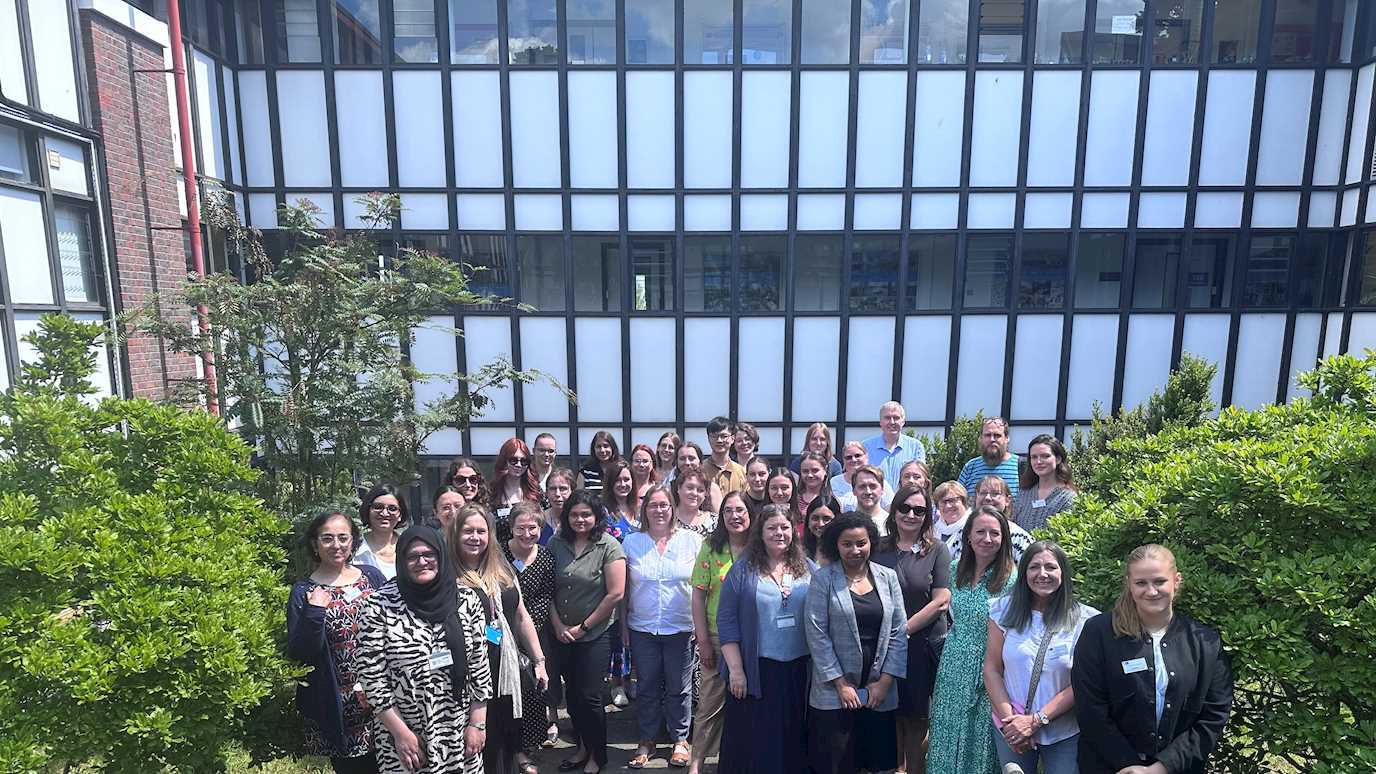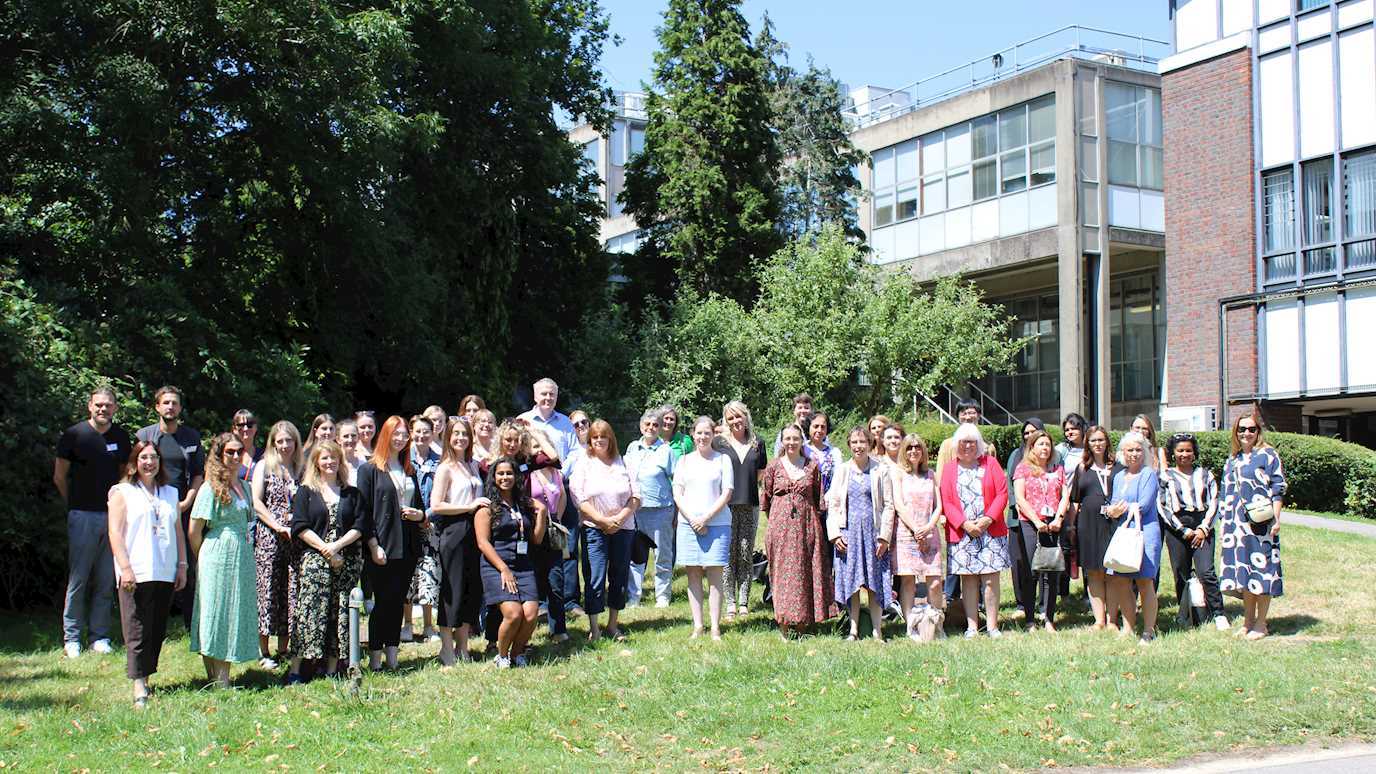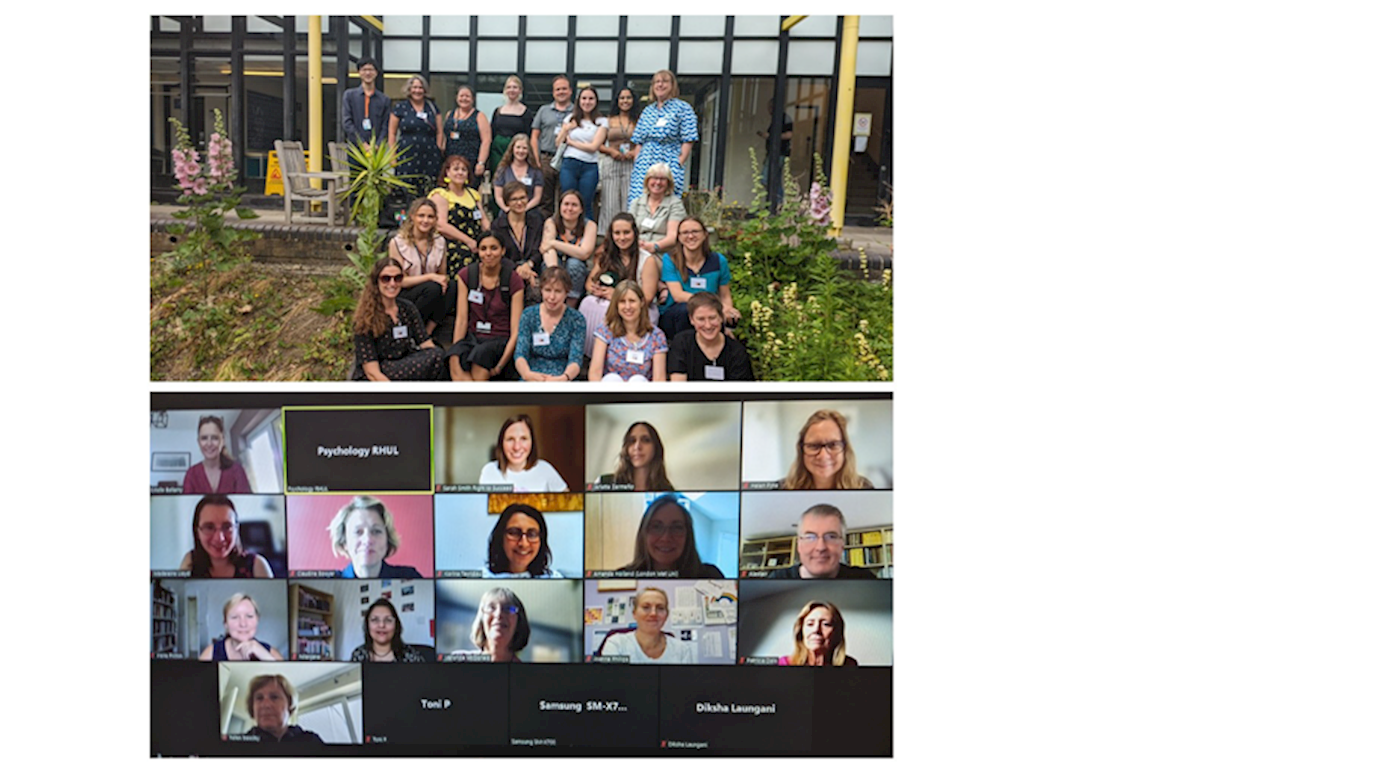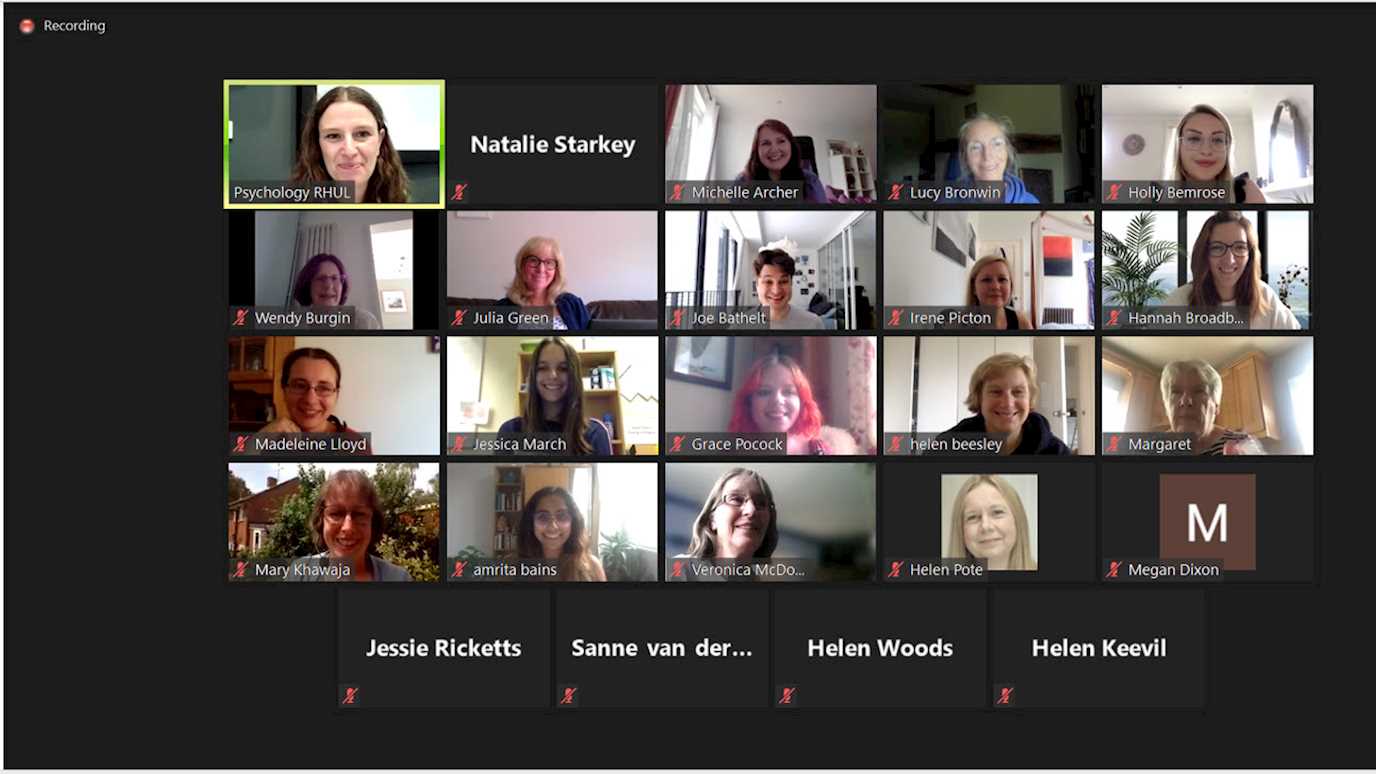Building on the success of the first meeting in 2016, the second Research and Practice Meeting was held on 4th July 2017 at Royal Holloway, University of London. The event brought together teachers, mental health workers and other professionals working in schools to share their expertise with researchers from the Department of Psychology, who presented their research findings. We would like to thank everyone involved for making the day a great success. A summary of the day’s talks and workshops is given below, as well as further resources.
Pupil Diversity
Many who attended the event are members of the South East Research Network for Schools (SERNS), which offers schools the opportunity to participate in research, as well as providing regular updates on new research within psychology and education. You can find out more information and sign up here.

Research Talks
The meeting opened with research talks on the theme of literacy, delivered by Dr Jessie Ricketts and Professor Kathy Rastle. Dr Jessie Ricketts opened proceedings with an update on her three-year longitudinal project looking at Vocabulary and Reading in Secondary Schools (VaRiSS). The project, which reached completion this July, was designed to address the idea of reciprocity between vocabulary and reading: how vocabulary knowledge can support reading comprehension as well as how new vocabulary can be acquired through reading. The vocabulary and reading abilities of an unselected sample of around 200 pupils in mainstream secondary schools were tracked from Year 7 through to Year 9. Jessie’s findings indicated that while there was a great deal of individual variation in these skills, there was very little change across the three years. Importantly, at age 14, the poorest performing 10-20% of pupils had vocabulary and reading skills below the level of a typical 9 year old. Furthermore, there was little evidence that the gap between these pupils and their higher-performing peers was narrowing, and many of these pupils were not receiving any additional support. These difficulties are likely to mean that many of these pupils struggle to access the curriculum. Following Jessie’s talk, discussion centred on approaches that secondary schools might take to support vocabulary and literacy skills, and future directions for the project, which include the development of age-appropriate materials for schools to use to support these skills.
Professor Kathy Rastle’s talk focused on the importance of explicit instruction for children learning to read. She reported a series of experiments conducted with adults in which participants were taught novel languages. The purpose of these experiments was to investigate participants’ ability to extract spelling-sound and spelling-meaning regularities from the novel languages in a similar way that children do when they learn to read English. Two approaches were used. In one approach, participants were not explicitly told about the spelling and meaning rules in the novel writing system, so they were forced to rely on ‘discovery learning’ to find them out. In the second approach, participants were given explicit instruction on how the novel language worked. Kathy and her team found that when participants relied on discovery learning, many struggled to extract regularities from the writing system, with only around a quarter of participants discovering both the spelling-sound and spelling-meaning regularities. There was also a large amount of individual variation, which was in part determined by oral language ability. However, when participants were explicitly told about the structure of the writing systems, almost all participants were able to generalise the rules to read untaught items, and they also showed better learning of the association between the spoken word and the meaning compared to participants who relied on discovery learning. These studies show that explicit instruction can help to structure future learning, and leads to better reading performance from the outset. Importantly, explicit instruction helps to minimise the impact of underlying differences in oral language skills, which has implications for special educational needs support. Following Kathy’s talk, discussion focused on whether these principles could be applied to spelling, and the importance of phonics combined with strong oral vocabulary for reading.
The next three talks focused on pupil diversity in relation to key mental health issues in schools. Dr Helen Pote spoke about the importance of mental health literacy in schools, also described as ‘mental health first aid’. She explained that around 50% of mental health problems begin by age 14, and that 1 in 10 children will have a mental health diagnosis, associated with an estimated cost of £13.4 billion. However, only 25% of those who are diagnosed will go on to see a mental health practitioner. Speaking about findings from her commissioned review, Helen noted the importance of introducing mental health first aid in schools to tackle the current lack of early intervention. In particular, the evidence reviewed suggests that a ‘whole-school’ approach appears to be the most effective in promoting mental health knowledge and awareness to students, staff and parents/carers alike. Helen left us with the take home message that consistent implementation of wellbeing practices in schools can reduce the number of mental health symptoms for both students and staff.
Following Helen’s overview of the need for mental health first aid, Dr Cat Sebastian presented her research findings relating to the specific issue of emotion regulation during adolescence. In particular, Cat explained how the strategy of temporal distancing – that is, imagining how you would feel about a particular event in the future -- may help to reduce mental health problems faced by adolescents, especially reactive aggression, which is sometimes thought of as ‘hot-headedness’. In a study of 10-22 year olds who were instructed to use a temporal distancing technique, Cat and her colleagues found it to be a very effective and easy to implement strategy in reducing distress when participants imagined themselves far into the future; the further participants imagined themselves, the more their distress was reduced. However, they also found that adolescents with high levels of reactive aggression were less able to reduce their levels of distress, which might be because these individuals were less able to imagine themselves as far into the future as other participants.
Rounding off our programme of research talks, Dr Eilidh Cage spoke about a number of myths surrounding autism. Autism is a neurodevelopmental condition characterised by difficulties in social communication, such as making or maintaining friendships, and repetitive behaviours and restricted interests, such as the importance of routines. Autism is a spectrum condition, for example some individuals have very high daily support needs whereas others can live independently. One myth that Eilidh highlighted was the idea that people should use ‘person-first’ language like ‘person with autism’ instead of identity-first language, ‘autistic person’. In fact, many people in the autism community prefer ‘autistic person’ to person-first language. Among other myths was the idea that autistic individuals have little empathy. On the contrary, many autistic individuals do experience extreme empathy for others. Finally, Eilidh debunked the myth that autism is only seen in boys. Autism in girls is under-diagnosed as their symptoms may be less ‘obvious’ to observers and they sometimes have better social skills than autistic boys. The take home message is that autistic individuals are all different, and understanding their preferences and stressors, and making peers understand and appreciate autism can help to make life easier for autistic people.
Workshops
Following the success of last year’s breakout discussions, this year’s afternoon session involved two parallel workshops in which practitioners shared their feedback to researchers on practical challenges faced in schools and how these might be addressed. One workshop focused on supporting language and literacy in school (facilitated by Dr Jessie Ricketts) and the other focused on supporting mental health during educational transitions (facilitated by Rachel Fahy and Dr Alana James). Each workshop benefitted from viewpoints representing a wide range of educational backgrounds, and we were delighted to receive feedback that the structure allowed participants express their ideas effectively. A brief summary of the discussions is included below. We welcome suggestions of topics for next year.
Supporting language and literacy in school
Facilitator: Dr Jessie Ricketts
The aim of this discussion group was to share good practice and ideas on supporting language and literacy in schools. The session began with a discussion about the main challenges to supporting language and literacy in both primary and secondary schools. The groups identified several themes. In primary schools, the main challenges included dealing with competing ideologies (for example, around phonics), the pressures of the curriculum and the difficulty finding room for flexibility in teaching practices, and trying to find the balance between inclusion and targeting specific difficulties. In secondary schools, issues were raised relating to the structure of secondary education (for example, different teachers for each subject, grouping of pupils with language and literacy needs alongside pupils with behavioural needs, and the lack of 1:1 teaching assistant support), the demands placed on secondary pupils to have the requisite reading skills to access the curriculum, and the lack of age-appropriate materials for adolescents. The comment was also made that it was necessary to avoid the stigmatisation of secondary pupils with reading difficulties, and that teaching training at secondary level should focus more on SEN and the importance of oral language skills.
The second part of the session focused on strategies and materials that could be used to promote language and literacy in secondary school, and how these differ from those used in primary education. A number of specific resources were highlighted:
- Barrington Stoke books
- Elklan language builders
- Word Aware
- National strategy folders
- Carol Christiansen decoding programme
- Axis education
- Oaka books
- Pie Corbett
- ELCISS
- Thinking Reading
Much of the discussion during this part of the session focused on the issue of teaching support. It was noted that TAs are expected to carry out interventions, but that they don’t get PPA time or additional time to liaise with teachers. For teachers themselves, more PPA time is needed to properly differentiate the curriculum. It was pointed out that these difficulties are linked to schools’ funding issues, and many schools can’t afford to increase PPA or TA time. Screening was identified as a useful strategy to identify those who required additional support, and to target resources appropriately. This might also help to distinguish between issues relating to motivation and issues relating to ability.
Sir Jim Rose concluded the session with some final thoughts. He emphasised that oral language is paramount to reading ability, and that everything else is parasitic on the spoken word. He suggested that early speaking and listening skills could be developed through enriched play, dialogue with adults and good modelling, and that the process of promoting oral language could begin long before children start to read. With regards to policy, he suggested that we need to acknowledge that knowledge, skills and understanding are crucial to accessing the curriculum, and that more attention should be given to building positive attitudes of students. He concluded by saying that we know more about the teaching of reading now than ever before, but that now we need to capitalise on this knowledge.
Supporting mental health during educational transitions
Facilitators: Rachel Fahy and Dr Alana James
The workshop began with open discussion, guided by the facilitators. To start, participants were asked to define ‘What does transition mean to you?’ Common themes in people’s responses were the ideas of ‘change’, ‘moving on’ and, ‘leaving something behind’, with several participants mentioning ideas of challenge and uncertainty. Next, the facilitators prompted the group to think about why mental health support might be needed during transitions. Group discussions centred around the loss of support from previous educational institutes and how students require support to manage new expectations, peer groups, pressure and to adjust to different social roles, often in more diverse groups. Alana James summarised the transition to university, the support needs that students face, and how these new pressures can influence the retention rate of students. In response to these needs, Rachel Fahy highlighted support mechanisms that are currently in place to support students in the transition to university, with a particular emphasis on peer support schemes. This prompted further group discussion, in which participants suggested multiple levels at which students could benefit from extra support: for example, in their arrival to university, at a departmental level, a college-wide level, and through external means of support, including the role of schools and parents in educational transitions. Practical suggestions for schools and parents included making the post of open days and seeking information regarding support available prior to transition. The group also raised concerns about the current climate for young people, pointing out the rise in not only the diagnosis of psychiatric conditions, but of students dropping out of University due to mental health difficulties (trebled from 2009/10 to 2014/15 (HESA report)). Rachel Fahy pointed out the advantages of declaring a mental health condition in UCAS forms and in the transition to university, including the availability of access to resources (financial and one-to-one support).
For the next part of the workshop, participants divided into three groups to tackle different questions: (1) In what key way(s) might transition be difficult for the young-person? (2) How could their current school potentially prepare the young person? (3) How could the new secondary school/university potentially support the young person with the transition?To facilitate discussion, each group considered case studies around the transition to Secondary school and the transition to University. One group focused on a case study relevant to their backgrounds, which involved the transition from mainstream- special-education schools and vice-versa. In response to question 1, participants thought about why a student might find educational transition difficult, and discussed factors such as moving away from home, or leaving current social relationships behind. In response to question 2, participants discussed the benefits of peer support systems and making all students aware of the different support options that are available to them. In response to question 3, the group also highlighted the importance of increasing awareness about support options and peer mentoring schemes. Specifically regarding the transition to secondary schools, practitioners pointed out how some secondary school staff often visit individuals in their primary schools to meet them beforehand and to ensure students have a familiar face prior to the transition. This was also reflected when discussing the transition to universities, with the idea that some universities allow an earlier transition period for individuals registered as disabled – this can help to point out key members of staff and services to students.
The workshop ended with a list of useful resources focused specifically on preparing students for transitions both before university and throughout the university transition period. Practitioners shared other resources and suggestions that they found useful in preparing and supporting students when making educational transitions.
Future Practitioner Events
We very much look forward to hosting future Research and Practice Meetings to keep up an ongoing collaboration between our researchers and colleagues who work with children and adolescents in a school setting. We would like to warmly invite you to join us again for the next event, which we will contact you about in due course. For those who were unable to attend the practitioner event this year, you are welcome to contact Dr Jessie Ricketts to be added to our mailing list and invited to future events.
























